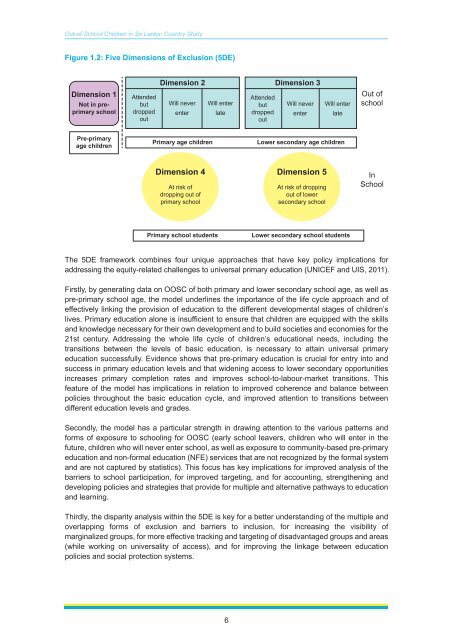Sri Lanka - Institut de statistique de l'Unesco
Sri Lanka - Institut de statistique de l'Unesco
Sri Lanka - Institut de statistique de l'Unesco
You also want an ePaper? Increase the reach of your titles
YUMPU automatically turns print PDFs into web optimized ePapers that Google loves.
Out-of-School Children in <strong>Sri</strong> <strong>Lanka</strong>: Country Study<br />
Figure 1.2: Five Dimensions of Exclusion (5DE)<br />
Dimension 1<br />
Not in preprimary<br />
school<br />
Atten<strong>de</strong>d<br />
but<br />
dropped<br />
out<br />
Dimension 2<br />
Will never Will enter<br />
enter late<br />
Atten<strong>de</strong>d<br />
but<br />
dropped<br />
out<br />
Dimension 3<br />
Will never<br />
enter<br />
Will enter<br />
late<br />
Out of<br />
school<br />
Pre-primary<br />
age children<br />
Primary age children<br />
Lower secondary age children<br />
Dimension 4<br />
At risk of<br />
dropping out of<br />
primary school<br />
Dimension 5<br />
At risk of dropping<br />
out of lower<br />
secondary school<br />
In<br />
School<br />
Primary school stu<strong>de</strong>nts<br />
Lower secondary school stu<strong>de</strong>nts<br />
The 5DE framework combines four unique approaches that have key policy implications for<br />
addressing the equity-related challenges to universal primary education (UNICEF and UIS, 2011).<br />
Firstly, by generating data on OOSC of both primary and lower secondary school age, as well as<br />
pre-primary school age, the mo<strong>de</strong>l un<strong>de</strong>rlines the importance of the life cycle approach and of<br />
effectively linking the provision of education to the different <strong>de</strong>velopmental stages of children’s<br />
lives. Primary education alone is insufficient to ensure that children are equipped with the skills<br />
and knowledge necessary for their own <strong>de</strong>velopment and to build societies and economies for the<br />
21st century. Addressing the whole life cycle of children’s educational needs, including the<br />
transitions between the levels of basic education, is necessary to attain universal primary<br />
education successfully. Evi<strong>de</strong>nce shows that pre-primary education is crucial for entry into and<br />
success in primary education levels and that wi<strong>de</strong>ning access to lower secondary opportunities<br />
increases primary completion rates and improves school-to-labour-market transitions. This<br />
feature of the mo<strong>de</strong>l has implications in relation to improved coherence and balance between<br />
policies throughout the basic education cycle, and improved attention to transitions between<br />
different education levels and gra<strong>de</strong>s.<br />
Secondly, the mo<strong>de</strong>l has a particular strength in drawing attention to the various patterns and<br />
forms of exposure to schooling for OOSC (early school leavers, children who will enter in the<br />
future, children who will never enter school, as well as exposure to community-based pre-primary<br />
education and non-formal education (NFE) services that are not recognized by the formal system<br />
and are not captured by statistics). This focus has key implications for improved analysis of the<br />
barriers to school participation, for improved targeting, and for accounting, strengthening and<br />
<strong>de</strong>veloping policies and strategies that provi<strong>de</strong> for multiple and alternative pathways to education<br />
and learning.<br />
Thirdly, the disparity analysis within the 5DE is key for a better un<strong>de</strong>rstanding of the multiple and<br />
overlapping forms of exclusion and barriers to inclusion, for increasing the visibility of<br />
marginalized groups, for more effective tracking and targeting of disadvantaged groups and areas<br />
(while working on universality of access), and for improving the linkage between education<br />
policies and social protection systems.<br />
6

















